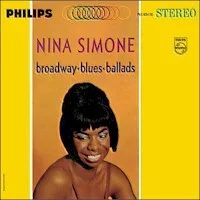Bitrate: MP3@320K/s
Time: 21:52
Size: 50.1 MB
Styles: Jazz vocals
Year: 1986/2014
Art: Front
[2:13] 1. I Hear Music
[2:54] 2. What Is There To Say
[2:43] 3. Come Back To Sorrento
[2:43] 4. Just One Of Those Things (From Jubilee ) Why Shouldn't I
[2:22] 5. Lullaby Of Birdland
[3:02] 6. Try A Little Tenderness
[2:57] 7. All About Ronnie
[2:54] 8. Spring Is Here
Chris Connor is a consummate actress with a song, and her musicianship and vocal range give new meanings to some familiar tunes, which include selections by George Shearing, Rodgers and Hart, the Gershwins, and Gordon Jenkins. Though she sang with big bands early in her career, she eventually chose to leave them in order to sing in the more intimate confines of the jazz clubs. Her musical flexibility and her unique, personal interpretations found their home there, with much less backup. As a result, this collection is a refreshing change from the tried and true, showcasing interpretations with unusual chromatic jumps, quick changes of key, movements from high to very low register, and even a song in which she and her accompanists simultaneously work the song in different tempos. She never misses a note or a beat.
Swing is Connor's forte, but she avoids pyrotechnics and gives her songs new meaning by slowing down the pace and simplifying such standards as "Lullaby of Birdland," "What is There to Say," and the sweetly whispery "Try a Little Tenderness," all with Ellis Larkins's sensitive and simple piano accompaniments. "Spring is Here," sung with bluesy confidence, is one of the best songs on the album, and she hits every one of the difficult, chromatic low notes, spot-on.
In "Why Shouldn't I," her acting, her sense of timing, and her ability to give her own interpretation without having a strong melodic line from the accompanying Ellis Larkin Trio are notable. "Ask Me," "Blue Silhouette," and the up-tempo "Chiquita from Chi-Wah-Wah" are sung with Sy Oliver's big band. The final six songs, with the Vinnie Burke Quartet, include the wonderful "Stella by Starlight" and a very dramatic and ineffably sad version of Gordon Jenkins's "Goodbye."
Connor is a musician, rather than "just" a singer, and the musicians who accompany her never "step on" her notes or intrude. She returns the compliment, allowing each of her accompanists to share the spotlight and the mood of the songs. One of the first singers to leave a successful Big Band career to create her own sound in the jazz clubs, Connor has created her own legend as a musician, her talents beautifully highlighted on this 1986 CD. ~Mary Whipple
Swing is Connor's forte, but she avoids pyrotechnics and gives her songs new meaning by slowing down the pace and simplifying such standards as "Lullaby of Birdland," "What is There to Say," and the sweetly whispery "Try a Little Tenderness," all with Ellis Larkins's sensitive and simple piano accompaniments. "Spring is Here," sung with bluesy confidence, is one of the best songs on the album, and she hits every one of the difficult, chromatic low notes, spot-on.
In "Why Shouldn't I," her acting, her sense of timing, and her ability to give her own interpretation without having a strong melodic line from the accompanying Ellis Larkin Trio are notable. "Ask Me," "Blue Silhouette," and the up-tempo "Chiquita from Chi-Wah-Wah" are sung with Sy Oliver's big band. The final six songs, with the Vinnie Burke Quartet, include the wonderful "Stella by Starlight" and a very dramatic and ineffably sad version of Gordon Jenkins's "Goodbye."
Connor is a musician, rather than "just" a singer, and the musicians who accompany her never "step on" her notes or intrude. She returns the compliment, allowing each of her accompanists to share the spotlight and the mood of the songs. One of the first singers to leave a successful Big Band career to create her own sound in the jazz clubs, Connor has created her own legend as a musician, her talents beautifully highlighted on this 1986 CD. ~Mary Whipple
Lullabys Of Birdland (Remastered)




















